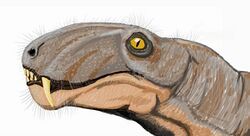Biology:Eotitanosuchidae
| Eotitanosuchidae | |
|---|---|

| |
| Life restoration of the eotitanosuchid Eotitanosuchus olsoni | |
| Scientific classification | |
| Domain: | Eukaryota |
| Kingdom: | Animalia |
| Phylum: | Chordata |
| Clade: | Synapsida |
| Clade: | Therapsida |
| Suborder: | †Biarmosuchia |
| Infraorder: | †Eotitanosuchia Boonstra, 1963 |
| Family: | †Eotitanosuchidae Tchudinov, 1960 |
| Type species | |
| †Eotitanosuchus olsoni Tchudinov, 1960
| |
| Genera | |
Eotitanosuchidae is an extinct family of biarmosuchian therapsids. The Eotitanosuchidae were large predatory therapsids of the Wordian epoch. It was once considered to belong to a separate infraorder of therapsids called Eotitanosuchia.
Characteristics
The Eotitanosuchians seem to be more advanced than the Biarmosuchia in that the temporal opening behind the eye socket—although small—is still somewhat larger than the biarmosuchians; it is expanded in the upper rear (posterodorsal) margin, allowing the area of attachment of the adductor (jaw closing) muscles to be visible from the dorsal (top) view looking down. The eotitanosuchian bite was stronger and more efficient than the biarmosuchian bite. For this reason, some paleontologists see the eotitanosuchids as transitional between the biarmosuchians and higher therapsids. It is at least as likely that features of a larger temporal opening—and hence increased muscle mass and biting power—evolved simultaneously among a number of early therapsid groups, due to the obvious advantages this adaptation conferred. One must be wary in applying cladistic methodology to characteristics that are likely to evolve simultaneously among many competing lineages. In other respects the eotitanosuchians are quite primitive; they were the least modified in their jaw apparatus from their sphenacodont ancestry.
References
External links
- Therapsida: Biarmosuchia at Palaeos
Wikidata ☰ Q5381971 entry
 |

